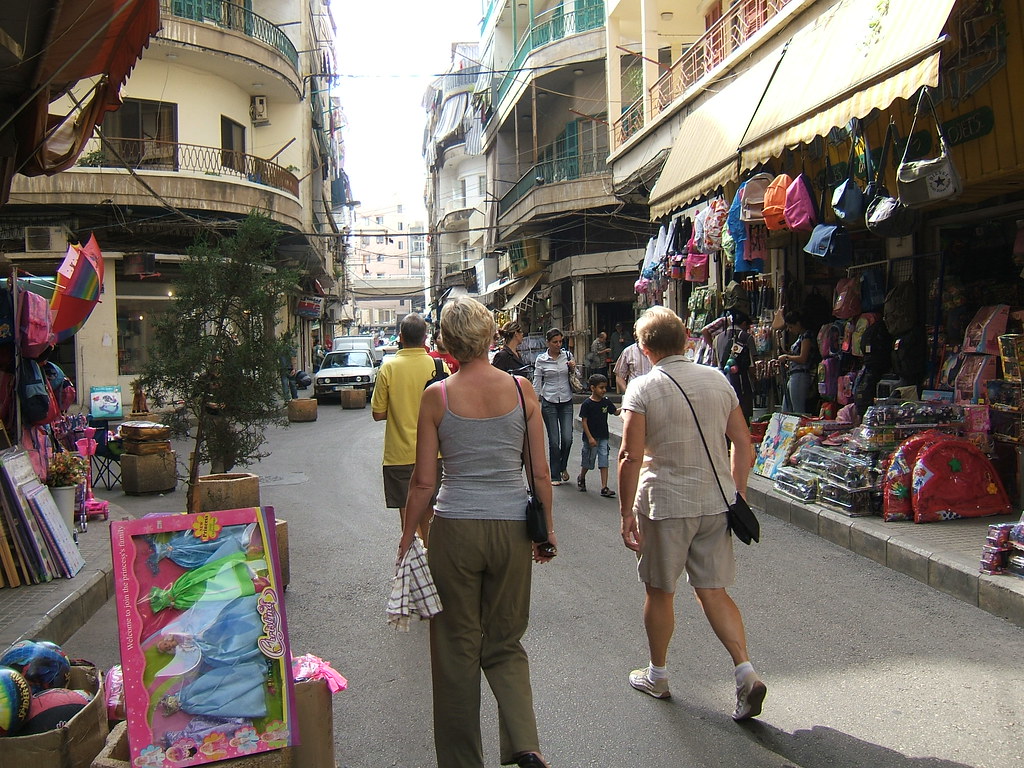#beirut streets
Text
Beirut Barbershop Series - Fujifilm X-Pro3
If you'd like to support my work, you can check out my Print Shop or Reblog!

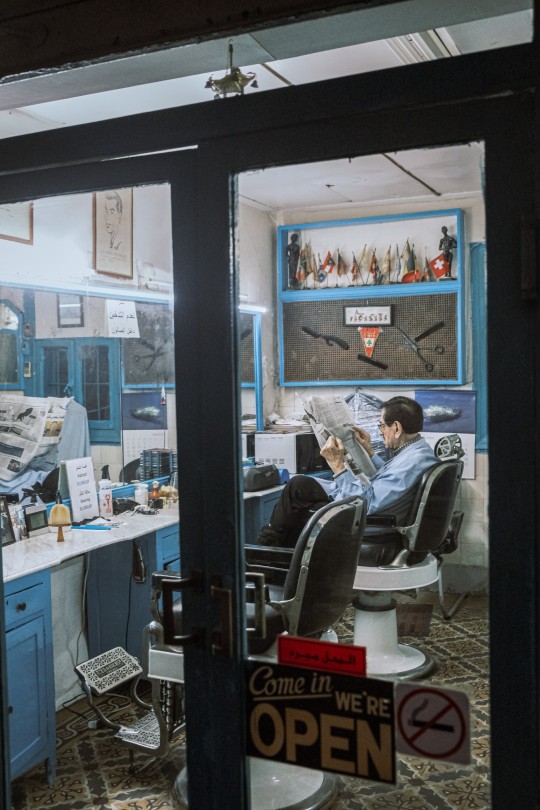

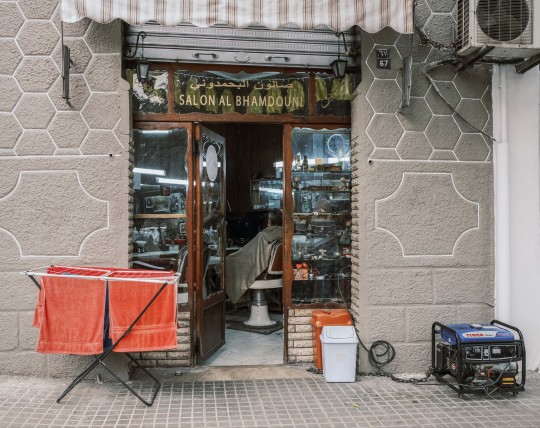
#photographers on tumblr#street photography#lebanon#beirut#lensblr#original photographers#streetphotography#middle east#oriental#film photography#barbershop#barber#fujifilm
142 notes
·
View notes
Text
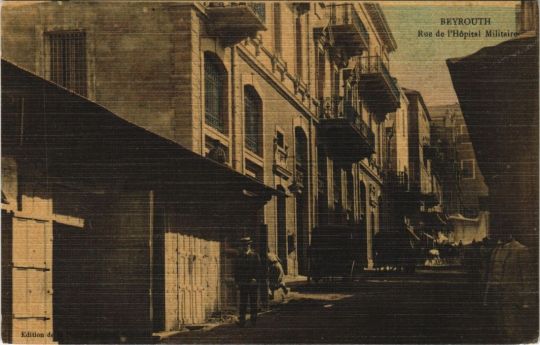
Street scene in Beirut, Lebanon
French vintage postcard
#carte postale#old#ansichtskarte#photo#vintage#postkaart#photography#briefkaart#postkarte#french#ephemera#scene#beirut#postcard#sepia#street#postal#tarjeta#lebanon#historic
7 notes
·
View notes
Text
Have Camera, Will Travel - Beirut, Lebanon
Around the Armenian District, a city break with friends, many years ago (around October 2008).
In the city centre of Beirut are the archaeological remains of a great example of the Roman Baths showing the underfloor heating system.
Below, is the "Downtown" city district with its fabulous buildings and wide boulevard streets with pavement cafés as well as upmarket shopping.
Photography ©Shell Chapman (that's me)!
#photography#travel#havecamera_willtravel#architecture#travel destinations#travel photography#city break#beirut#lebanon#street photography#armenian#roman baths#archaeology#city center
4 notes
·
View notes
Photo
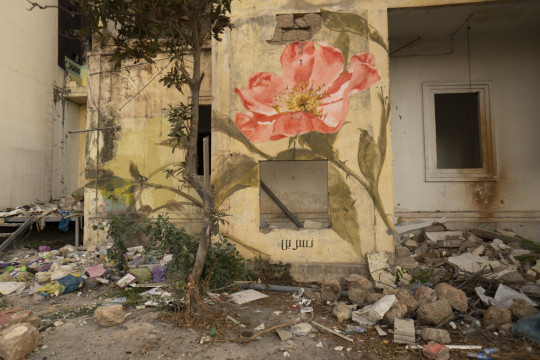
Rosa Canina.
‘Medicinal Flowers of Lebanon’ by Faith XLVII Sprout from the Damaged Streets of Beirut
Rosehips, horned poppies, and an African carline thistle grow from the debris and ruined buildings in Beirut following a mural series by Faith XLVII. The South African artist (previously) traveled to the Lebanese city this September as part of Underline—the ongoing project is helmed by the art collective Persona in collaboration with the Hamra-based NGO Art of Change, which is focused on using public works for protest and to spark change—to paint a collection of curative flowers that appear to sprout from the rubble.
All images © Faith XLVII
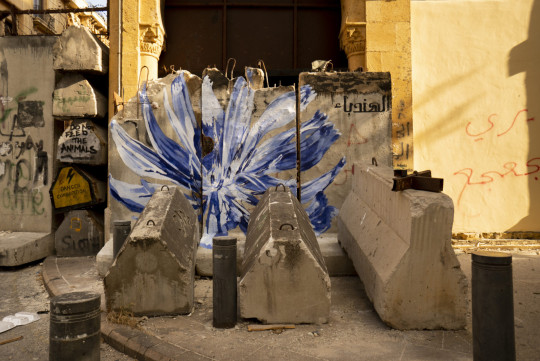
Cichorium intybus
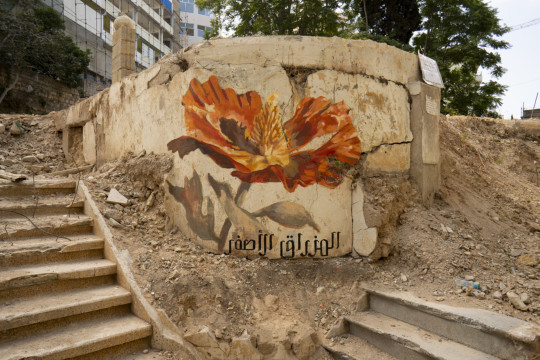
Glaucium flavum

Asphodelus microcarpus
#faith xlvii#artist#street artist#mural#medicinal flowers of lebanon#lebanon#damaged streets#beirut#mural series#south african artist#underline#persona#art collective#hamra-based ngo art of change#street art
21 notes
·
View notes
Photo

50 shades of gray
#beirut#lebanon#street photography#graffiti art#sidewalk#lebanese protests#revolution#selfie stick#street kid
2 notes
·
View notes
Text
Israel has just bombed a hospital where hundreds of wounded and refugees were taking solace. Journalists in Gaza have reported there was hardly a single body whole in the aftermath (If you can stomach it, there's a video of a father holding what remains of his child). At least 500 people killed by IOF soldiers, who planned this action, got into an airplane and dropped that bomb willingly. The deadliest attack in five wars, according to the Ministry of Health.
Israel has denied ownership of the attack and said it was a misfired Hamas rocket. Originally, they celebrated it on their social media, saying they had destroyed a Hamas target, treating the deaths like an unfortunate collateral. After international backlash, they posted videos to their social media claiming it was a Hamas rocket. The video, though, shows a second explosion 40 minutes after the airstrike, and they edited it our of their tweet in a pathetic attempt at covering up.
Israel has said multiple times that they were going to bomb hospitals. They told doctors to evacuate and leave their patients to death because they were going to bomb, namely: Al Shifa, Shuhada Al Aqsa and the Quwaiti Hospital. Al Shifa housed at least 10.000 refugees and wounded, and worked as a hub for the press because it was one of the only hospitals that still had working generators. Medical crew worked with sirens blaring to signal the hospitals were not empty. This was a purposeful massacre. These people died hungry, thirsty and in pain because of the Israeli government's cruelty.
CNN and other media outlets already tried to pin the blame on Hamas, parroting back the pathetic propaganda being sold by the IOF. Even in death, Palestinians can't be respected and are used to further their own oppression. These people's deaths are not going to be in vain. Within our lifetimes, Palestine will be free.
Take action. The Labour Party in the UK had an emergency meeting today after several councilors threatened to resign if they didn't condemn Israeli war crimes. Calling to show your complaints works.
FOR PEOPLE IN THE USA: USCPR has developed this toolkit for calls
FOR PEOPLE IN THE UK: Friends of Al-Aqsa UK and Palestine Solidarity UK have made toolkits for calls and emails
FOR PEOPLE IN GERMANY: Here's a toolkit to contact your representatives by Voices in Europe for Peace
FOR PEOPLE IN IRELAND: Here's a toolkit by Voices in Europe for Peace
FOR PEOPLE IN POLAND: Here's a toolkit by Voices in Europe for Peace
FOR PEOPLE IN DENMARK: Here's a toolkit by Voices in Europe for Peace
FOR PEOPLE IN SWEDEN: Here's a toolkit by Voices in Europe for Peace
Protests in support have already erupted in Beirut, Madrid and Rabat in response to the shelling of the hospital. Join your local protest and raise your voices. For people in the US, Israel has just asked for additional $10bi in aid on top of the annual $3.8bi already given to them. Palestinians are asking that you refuse this loudly, with their every breath.
Here's a constantly updating list of protests:
Global calendar
USA calendar
Here are upcoming events:
WASHINGTON, DC: Outside Congress on 18/10 at 12 PM
WASHINGTON, DC: NATIONAL MARCH in front of the White House on 4/11 at 12 PM
SAN DIEGO: 2125 Pan American E Rd. (Spreckles Organ Pavillion) on 18/10 at 7 PM
NEW YORK: 72nd st. And 5th ave., Brooklyn on 21/10 at 2 PM
NEW YORK: CUNY Grad Building on 18/10 at 2 PM
NEW YORK: Oct 18, 5pm, Steinway & Astoria Blvd.
DALLAS: 1954 Commerce Street (Dallas Morning News Building) on 19/10 at 3 PM
[CAR RALLY] KITCHENER-WATERLOO: Fairview Park, 2960 Kingsway Dr. on 18/10 at 6 PM
KITCHENER-WATERLOO: CBC Building, 117 King St. W on 19/10 at 5 PM
HOUSTON: Zionist Consulate, 24 Greenway Plaza on 18/10 at 4 PM
OMAHA: 72nd St & Dodge St on 18/10 at 6 PM
SAINT PAUL, MN: Oct. 18, 5:30pm. State Capitol, 75 Rev Dr Martin Luther King Jr. Blvd.
BALTIMORE: Oct 20, 6pm. Baltimore City Hall
DUBLIN: Leinster House, Kildare Street, Dublin 1 on 18/10 at 5 PM
THURLES: Liberty Square on 19/10 at 7 PM
LURGAN: Market Street on 21/10 at 3 PM
PORTO ALEGRE: Rua João Alfredo, 61 on 18/10 at 19h
RIO DE JANEIRO: Cinelândia on 19/10 at 17h
RECIFE: Parque Treze de Maio on 19/10 at 17h
MANAUS: Teatro Amazonas, Largo de São Sebastião on 19/10 at 17h
SÃO PAULO: Praça Oswaldo Cruz on 22/10 at 11h
FOZ DO IGUAÇU: Praça da Paz on 22/10 at 9h
TSHWANE: Belgrade Square Park, Jan Shoba Street on 20/10 at 10 AM
VEREENIGING: Roshnee Sports Grounds on 21/10 at 14h30
Feel free to add more resources
9K notes
·
View notes
Photo

📸12.03.2023 "Growing age can kill the beauty, not the style" 💚 -Amit Kalantri #art #feelings #beauty #photography #streetphotography #mobilephotography #blackandwhite #street #car #black #white #aging #beirut #walking #darkness (at Beirut, Lebanon) https://www.instagram.com/p/Cpsqo7VIM_q/?igshid=NGJjMDIxMWI=
#art#feelings#beauty#photography#streetphotography#mobilephotography#blackandwhite#street#car#black#white#aging#beirut#walking#darkness
0 notes
Text
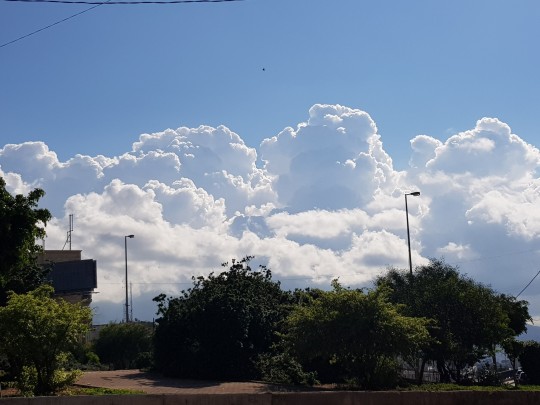
Cotton clouds! Skies of Beirut
1 note
·
View note
Text
Hey check this out
I was making a zine (solarpunk ofc) and decided to use a bunch of old National Geographic magazines to cut up and use in a scrappy diy scrapbook fashion and of course I started reading them. This one in particular:
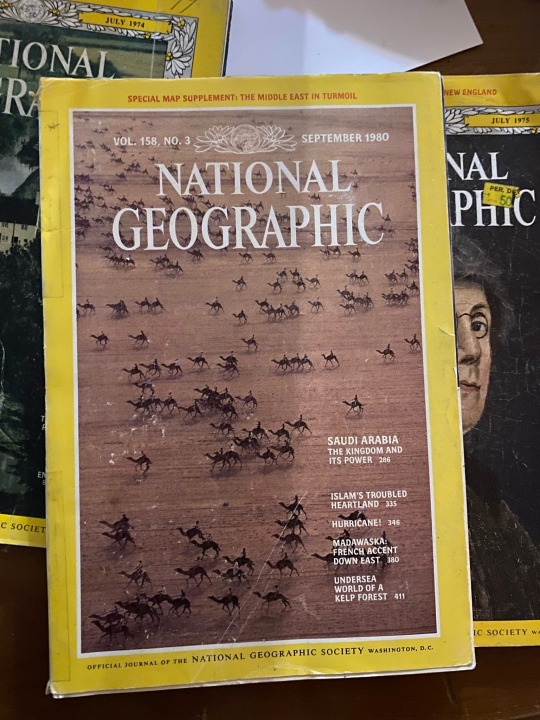
It caught my eye because it’s from September 1980 & talks about the Middle East. My brain wonders if they mention Palestine and they do! I copied the text for accessibility, but I put pictures at the end of the original pages.
“Jerusalem: reunited or occupied? The question has divided the city's 400,000 Jews and 100,000 Arabs since Israel annexed East Jerusalem in 1967.
BEIRUT, JANUARY 1975. Armed soldiers lead me through labyrinthine back streets, up a dark stairway to a midnight rendez-vous. Only a bare bulb lights the temporary command post; Yasir Arafat, chairman of the Palestine Liberation Organization, seldom dares spend two days in the same place. “Our argument is not with the Jews” He tells me. "We are both Semites. They have lived with us for centuries. Our enemies are the Zionist colonizers and their backers who insist Palestine belongs to them exclusively.
We Arabs claim deep roots there too."
Two decades ago Palestinians were to be found in United Nations Relief Agency camps at places like Gaza and Jericho, in a forlorn and pitiable state. While Palestinian spokesmen pressed their case in world cap-itals, the loudest voice the world heard was that of terrorists, with whom the word Palestinian came to be associated. Jordan fought a war to curb them. The disintegration of Lebanon was due in part to the thousands of refugees within its borders.
Prospects for peace brightened, however, when President Anwar Sadat of Egypt, most powerful of the Arab countries, made his historic trip to Israel in November 1977. A year later Sadat and Israeli Prime Minister Menachem Begin signed the Camp David accords, a framework for the return of the occupied Sinai Peninsula to Egypt.
The former enemies established diplomatic relations and opened mail, telephone, and airline communications.
The Camp David accords also addressed the all-important Palestinian question but left it vague. Sadat insists that any lasting peace depends on an eventual Palestinian homeland in the Israeli-occupied West Bank and Gaza. Israel agrees to limited autonomy for those regions, but, fearful of a new and hostile Palestinian state suddenly planted on its borders, insists that Israeli troops must maintain security there.
Crowded Rashidiyah refugee camp, set among orange groves south of the ancient Phoenician port of Tyre in Lebanon, lies on the front lines. Frequent pounding by Israeli military jets and warships seeking PLO targets has war-hardened its population, some 13,700 Palestinians.
At the schoolyard I watched a solemn flag raising. Uniformed ashbal, or lion cubs, stood rigid as color guards briskly ran up the green-white-and-black Palestinian flag.
Ranging in age from 8 to 12, they might have been Cub Scouts— except for the loaded rifles they held at present arms. Behind them stood two rows of girls, zaharat, or little flowers. Same age, same weapons.
Over lunch of flat bread, hummus, yo-gurt, and chicken I commented to my hosts, a group of combat-ready fedayeen, that 30 years of bitter war had settled nothing nor gained the Palestinians one inch of their homeland. Was there no peaceful way to press their cause?
"Yes, and we are doing it. Finally, after 30 years, most countries in the United Nations recognize that we too have rights in Palestine. But we feel that until your country stops its unconditional aid to Israel, we have two choices: to fight, or to face an unmarked grave in exile."
AFTER CROSSING the Allenby Bridge from Amman, I drove across the fertile Jordan Valley through Arab Jericho and past some of the controversial new Jewish settlements: Mitzpe Jericho, Tomer, Maale Adumim, Shilat. Then as I climbed through the steep stony hills to Jerusalem, I saw that it too had changed. A ring of high-rise apartments and offices was growing inexorably around the occupied Arab side of the walled town. Within the wall, too, scores of Arab houses had been leveled during extensive reconstruction.
"Already 64 settlements have been built on the West Bank," said a Christian Palestinian agriculturist working for an American church group in Jerusalem. "And another 10 are planned," he said. Unfolding a copy of the master plan prepared in 1978 by the World Zionist Organization, he read: "Real-izing our right to Eretz-Israel... with or without peace, we will have to learn to live with the minorities...
The Israeli Government has reaffirmed the policy. In Prime Minister Menachem Begin's words: "Settlement is an inherent and inalienable right. It is an integral part of our national security."
"Security" is a word deeply etched into the Israeli psyche. The country has lived for 30 years as an armed camp, always on guard against PLO raids and terrorist bombings.
Whenever such incidents occur, the response is quick: even greater retaliation.
In Jerusalem I met with David Eppel, an English-language broadcaster for the Voice of Israel. "We must continue to build this country. Israel is our lawful home, our des-tiny. We have the determination, and an immense pool of talent, to see it through." His cosmopolitan friends a city plan-ner, a psychology professor, an author gathered for coffee and conversation at David's modern apartment on Jerusalem's Leib Yaffe Road.
Amia Lieblich's book, Tin Soldiers on Jerusalem Beach, studies the debilitating effects almost constant war has had on life in the Jewish state, a nation still surrounded by enemies. As she and her husband kindly drove me to my hotel in Arab Jerusalem afterward, some of that national apprehension surfaced in the writer herself.
"We don't often come over to this part of town," she said. "Especially at night."
I DROVE OUT of the Old City in the dark of morning and arrived a few hours later at the nearly finished Israeli frontier post, whence a shuttle bus bounced me through no-man's-land to the Egyptian ter-minal. As a result of the Egyptian-Israeli treaty, it was possible for the first time since 1948 to travel overland from Jerusalem to Cairo. An Egyptian customs man opened my bags on a card table set up in the sand. I took a battered taxi into nearby El Arish, to a sleepy bank that took 45 minutes to convert dollars into Egyptian pounds, Then 1 hired a Mercedes for the
200-mile run across the northern Sinai des-ert, the Suez Canal, and the Nile Delta. By sundown Cairo was mine.
Despite official government optimism, I found many in Cairo worried that President Sadat's bold diplomatic gestures might fail.
The city was noticeably tense as Israel officially opened its new embassy on Mohi el-Din Abu el-Ez Street in Cairo's Dukki quarter. Black-uniformed Egyptian troops guarded the chancery and nearby intersections as the Star of David flew for the first time in an Arab capital. Across town, police with fixed bayonets were posted every ten feet around the American Embassy. Others were posted at the TV station and the larger hotels. Protests were scattered, mostly peaceful. None disturbed the cadence of the city.
Welcoming ever larger delegations of tourists and businessmen from Europe and the U.S., Cairo was busier than ever-and more crowded. Despite a building boom, many Egyptians migrating from the countryside, perhaps 10,000 a month, still find housing only by squatting among tombs at the City of the Dead, the huge old cemetery on the southeast side of the capital.
Even with the new elevated highway and wider bridge across the Nile, half-hour traffic standstills are common. Commuters arrive at Ramses Station riding even the roofs of trains, then cram buses until axles break.
Cairo smog, a corrosive blend of diesel fumes and hot dust from surrounding des-erts, rivals tear gas.
Despite the rampant blessings of prog-ress, Cairo can still charm. In the medieval Khan el-Khalili bazaar near Cairo's thousand-year-old Al-Azhar University, I sought out Ahmad Saadullah's sidewalk café. I found that 30 piasters (45 cents) still brings hot tea, a tall water pipe primed with tobacco and glowing charcoal, and the latest gossip. The turbaned gentleman on the carpeted bench opposite was unusually talk-ative; we dispensed with weather and the high cost of living and got right to politics:
"Of course I am behind President Sadat, but he is taking a great risk. The Israelis have not fully responded. If Sadat fails, no other Arab leader will dare try for peace again for a generation."
Across town at the weekly Akhbar El-Yom newspaper, one of the largest and most widely read in the Middle East, chief editor Abdel-Hamid Abdel-Ghani drove home that same point.
"What worries me most is that President Sadat's agreement with Israel has isolated Egypt from our brother nations," he told me. "When Saudi Arabia broke with us, it was a heavy loss. The Saudis are our close neighbors. Now they have canceled pledges for hundreds of millions in development aid to Egypt. Some 200,000 Egyptians-teach-ers, doctors, engineers live and work in the kingdom.
"And Saudi Arabia, guardian of the holy cities of Mecca and Medina, remains for Muslim Egypt a spiritual homeland."
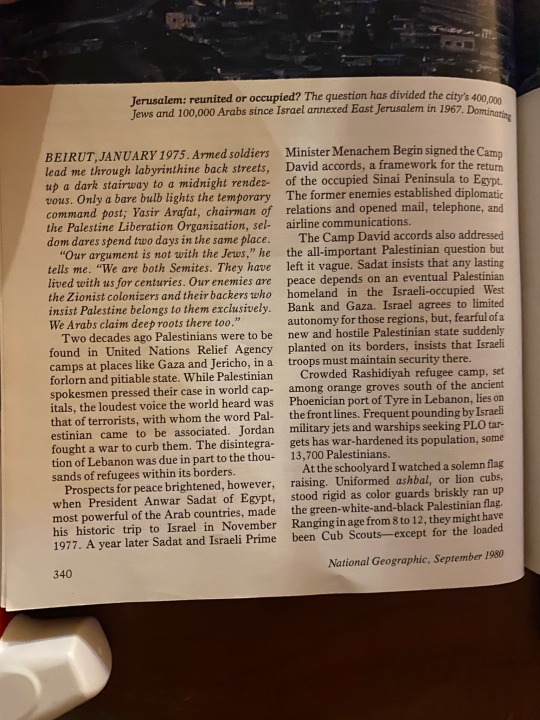
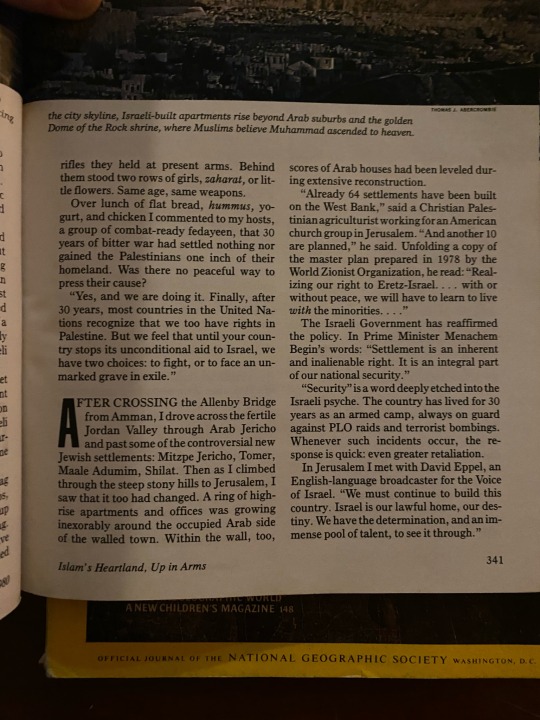
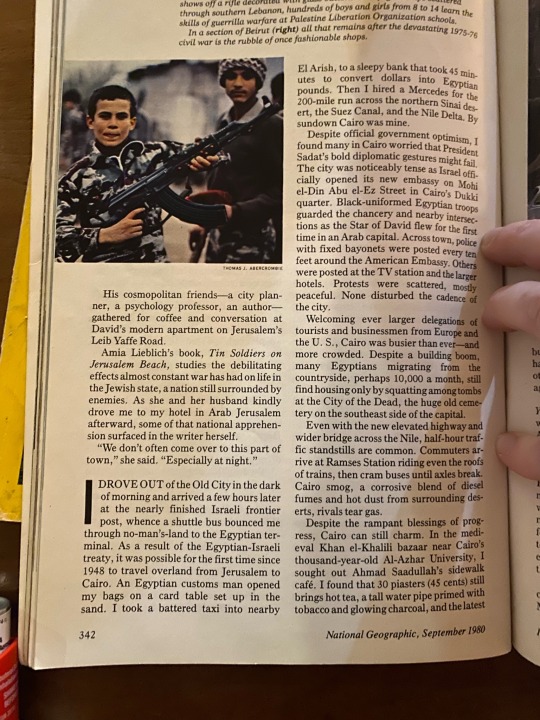
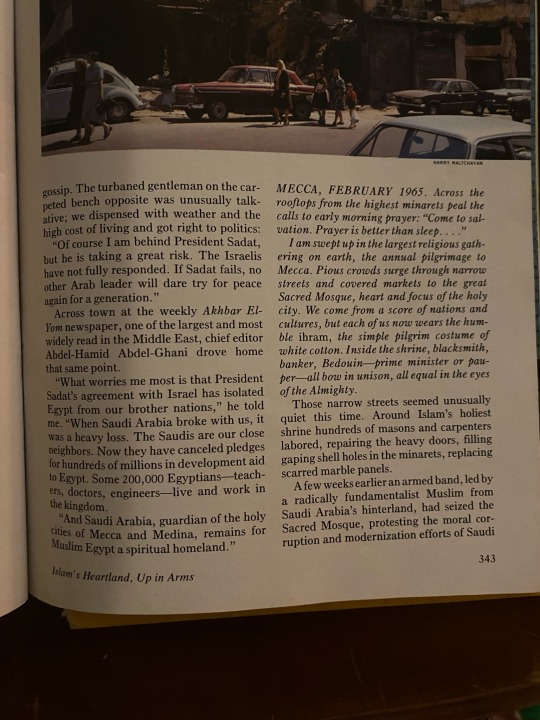
This magazine was published before my mom was born, and yet the sentiments have basically unchanged. An interesting look at the past, and more proof this didn’t start October 7th. (But imagine my followers already knew that)
#Palestine#free palestine#from the river to the sea palestine will be free#national geographic#September 1980
52 notes
·
View notes
Text
[Naharnet is Lebanese Private Media]
Hundreds of people took to the streets Saturday in some Lebanese areas and in the country’s Palestinian refugee camps in celebration of Hamas’ unprecedented operation that has stunned Israel.
In the Bourj al-Barajneh camp south of Beirut, residents danced in the streets, while young men in the northern city of Tripoli distributed celebratory sweets to passersby in the streets.
Demonstrators also took to the streets in the southern city of Sidon and in Beirut's southern suburbs.
In the Bekaa Valley, pro-Palestinian demonstrators blocked the roads.
7 Oct 23
101 notes
·
View notes
Text
Saida's Sea Castle (Arabic: قلعة صيدا البحرية) was built by the crusaders in the thirteenth century.
To support my work, check out my Print Shop!
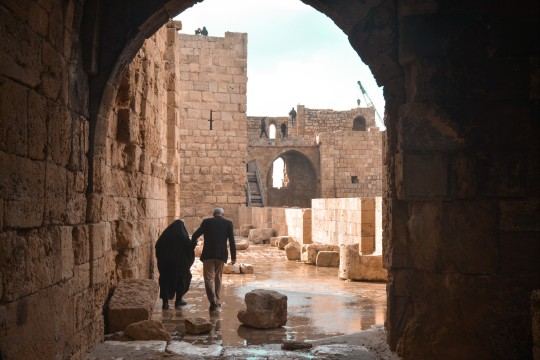
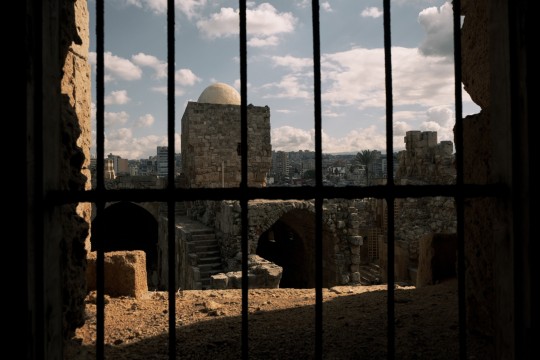
#photographers on tumblr#lebanon#street photography#beirut#lensblr#original photographers#middle east#oriental#film photography#streetphotography#history#historical monuments#saida#castle
64 notes
·
View notes
Text

Street scene in Beirut, Lebanon
French vintage postcard
#vintage#beirut#tarjeta#briefkaart#street#postcard#photography#postal#carte postale#sepia#ephemera#historic#french#ansichtskarte#postkarte#scene#lebanon#postkaart#photo
1 note
·
View note
Text
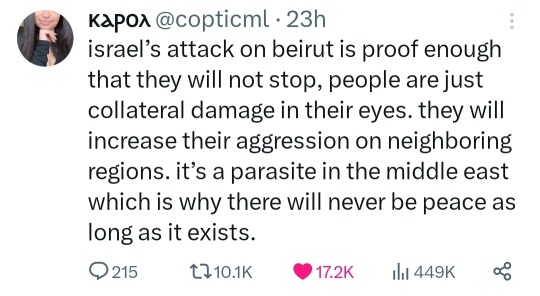
israel’s attack on beirut is proof enough that they will not stop, people are just collateral damage in their eyes. they will increase their aggression on neighboring regions. it’s a parasite in the middle east which is why there will never be peace as long as it exists. [@/ copticml on X. 01/02/24.]
This is part of their zionist project -to spread out into Lebanon and neighbouring countries. If anyone thought this was going to 'stop' at Gaza, you're beyond naive -and this isn't the first time the IOF has denied striking at Lebanon. Israehell will start wars with countries they want to colonize and settle on. This isn't fear mongering, this is the reality, and it's absolutely horrifying.
#feminist#feminism#social justice#free palestine#free gaza#settler violence#settler colonialism#lebanon#end the occupation#anti zionisim#world politics#current events#al jazeera#al jazeera english#israel is a war criminal#israel is a terrorist state#israel is an apartheid state#beirut
63 notes
·
View notes
Text
The October 7 attack and its aftermath have finally brought the disparate elements of this struggle against Jews to the surface, its participants surging into the streets and onto social media—suggesting that Hamas knew something important about the world that many of us didn’t see, or didn’t want to.
When I was a reporter for an international news agency at the time of the Hamas takeover in Gaza in 2007, I discovered that it was impolitic to mention what Hamas clearly announced in its founding charter from 1988: Namely, that “our struggle against the Jews is very great and very serious,” and the Jews were “behind the French Revolution, the Communist revolution and most of the revolutions we heard and hear about, here and there. With their money they formed secret societies, such as Freemasons, Rotary Clubs, the Lions, and others in different parts of the world for the purpose of sabotaging societies and achieving Zionist interests.”
This didn’t sound like “Free Palestine.” But as a rule, on the rare occasions that Western news organizations felt compelled to mention the document, they left those parts out.
The historical examples from the charter suggest that in the war against Judaism, the ideologues of Hamas understand themselves to be operating in a broad coalition and carrying on a long tradition. This is true. “Islam and National Socialism are close to each other in the struggle against Judaism,” Hajj Amin al-Husseini, the mufti of Jerusalem and one of the fathers of the Palestinian national movement, said in 1944. This was in a speech to members of an SS division he helped raise, made up of Bosnian Muslims. “Nearly a third of the Qur’an deals with the Jews. It has demanded that all Muslims watch the Jews and fight them wherever they find them,” he said, an idea that would reappear four decades later in the Hamas charter. When the mufti testified before a British commission of inquiry in 1936, he quoted The Protocols of the Elders of Zion, the Tsarist forgery describing a global Jewish conspiracy, which is also the source for parts of the Hamas charter and remains popular across the Middle East. (I once found the book for sale at a good shop near the American University of Beirut.) The Hamas army, known as the Izz ad-Din al-Qassam Brigades, is named for one of the mufti’s most famous proteges.
The movement became savvy enough to water down its charter a few years ago, but its leaders have remained honest about their intent. “You have Jews everywhere,” one former Hamas minister, Fathi Hammad, shouted to a crowd in 2019, “and we must attack every Jew on the globe by way of slaughter and killing, with God’s will.”
In the liberal West, no sane person would own up to believing The Protocols. (At least not yet; things are moving fast.) But an Italian can hold a prominent U.N. job, for example, after saying she believes a “Jewish lobby” controls America, and you can hold a tenured position at the best universities in the West if you believe that the only country on earth that must be eliminated is the Jewish one.
My experience in the Western press corps was that sympathy for Hamas was not just real but often more substantial than sympathy for Jews. In Europe and North America, as we’ve now seen on the streets and on campuses, many on the progressive left have arrived at an ideology positing that one of the world’s most pressing problems is the State of Israel—a country that has come to be seen as the embodiment of the evils of the racist, capitalist West, if not as the world’s only “apartheid” state, that being a modern synonym for evil.
Jews could no longer officially be hated because of their ethnicity or religion, but can legitimately be hated as supporters of “apartheid” and as the embodiment of “privilege.” The pretense that this is a critique of Israel’s military tactics, or sincere desire for a two-state solution, has now largely been dropped.
88 notes
·
View notes
Photo

Bridge to nowhere
0 notes
Text
🇵🇸 🚨 GLOBAL PROTESTS STAND IN SOLIDARITY WITH PALESTINIANS UNDER SIEGE AND BOMBARDMENT IN THE GAZA STRIP 🇵🇸
A global strike has been launched, standing in solidarity with Palestinians under siege and bombardment in the Gaza Strip on Monday morning.
With #Strike_For_Gaza currently the largest trending hashtag internationally.
The General Strike takes place just two days after the United States used its veto power in the United Nations Security Council to kill a resolution calling for a ceasefire in Gaza.
In Palestine, protests swept the occupied West Bank, with Universities, banks and businesses closed and popular calls for confrontation with the occupation anywhere possible.
Public transportation was shut down on all routes while factories and plants were also closed.
In Lebanon, shops and stores were empty as the majority of the population participated in the strike, with only minimal movement through the streets of the Capital, Beirut, as well as other Lebanese cities.
After Lebanon's authorities approved participation in the General Strike, several corporations chose to close its doors in compliance, along with both public and private schools and other public administrations.
Lebanon's Ministry of Foreign Affairs and Expatriates also closed its doors in Lebanon, as well as its missions abroad in accordance with the memorandum of the Council of Ministers.
In Jordan, the General Strike was observed in the capital, Amman, and in Irbid in the north, where large numbers of businesses closed and pro-Palestine banners were erected in the streets.
A noticeable decrease in city traffic and the number of students in schools was noted, reflecting the high participation levels in the strike.
In Turkey, a significant number of shops and markets have been closed in solidarity with Palestine and in rejection of Israel's genocide in Gaza.
Protests are also ongoing in parts of Africa, with video showing a protest at the U.S. Embassy in Mauritania.
Nearly 18'000 Palestinians have been killed in Israel's genocidal war in Gaza, with another 47'000 wounded, 70% of whom are women and children, according to the Gaza Ministry of Health.
#source
#videosource1
@WorkerSolidarityNews
#gaza#strike for gaza#general strike#palestine protest#protests#politics#geopolitics#gaza strip#gaza news#palestine#solidarity with palestine#free palestine#free gaza#israel#israel news#israeli occupation#occupied palestine#news#middle east#war#wars#war news#world news#international news#global news#breaking news#current events#occupation#israel palestine conflict#conflict
75 notes
·
View notes

